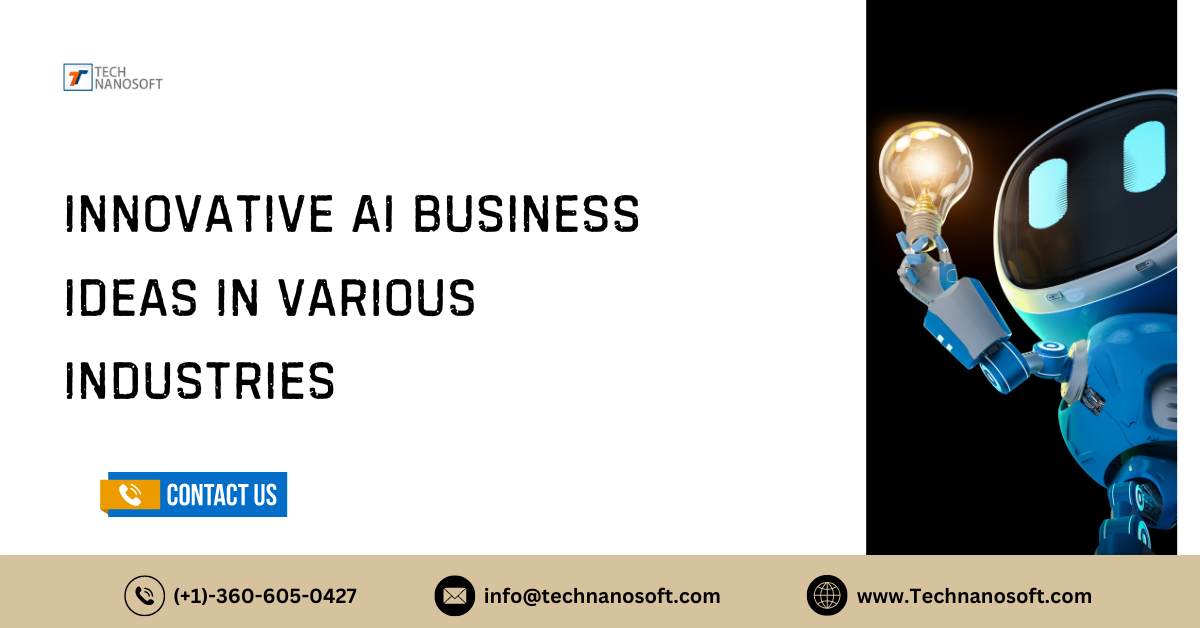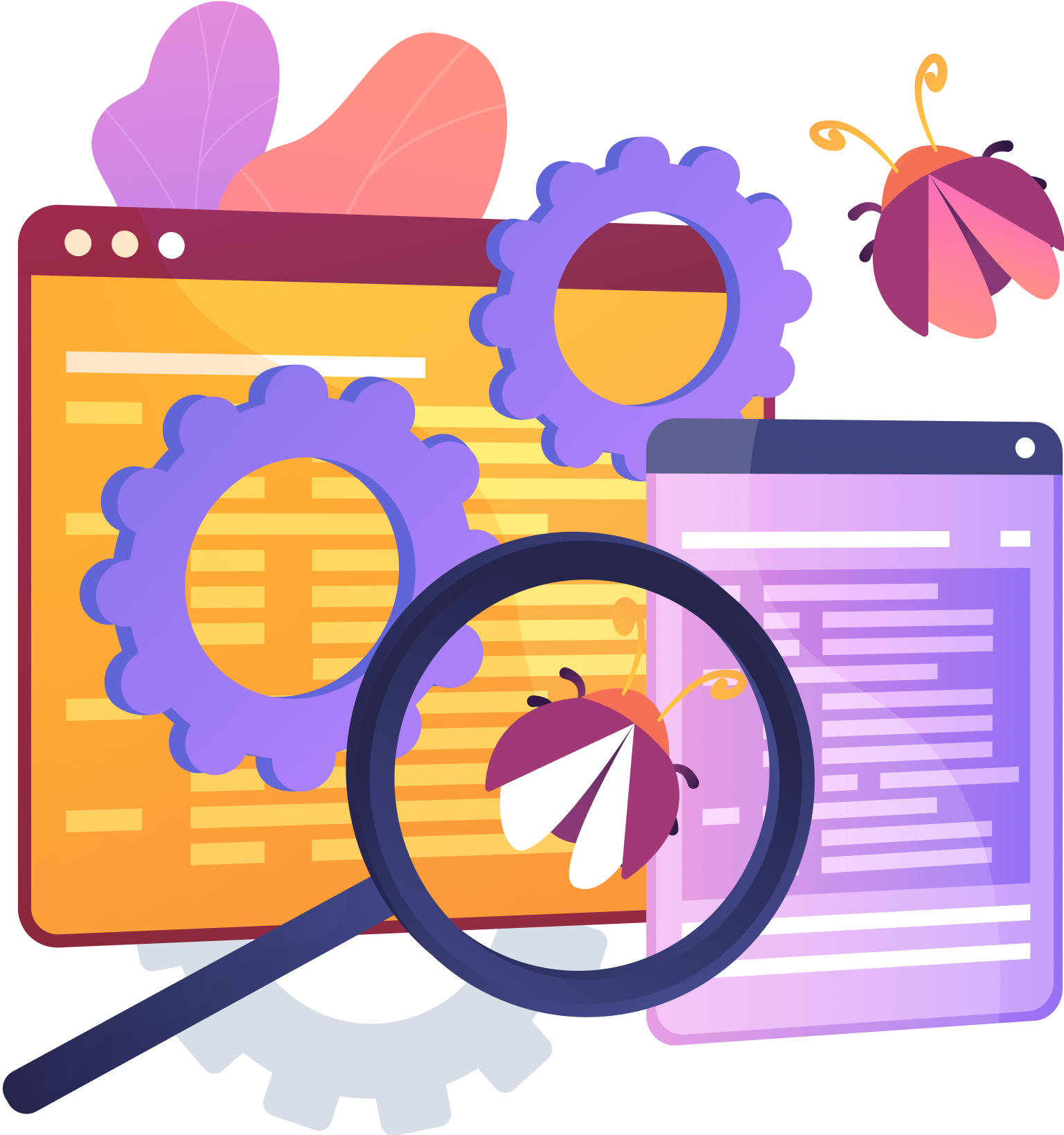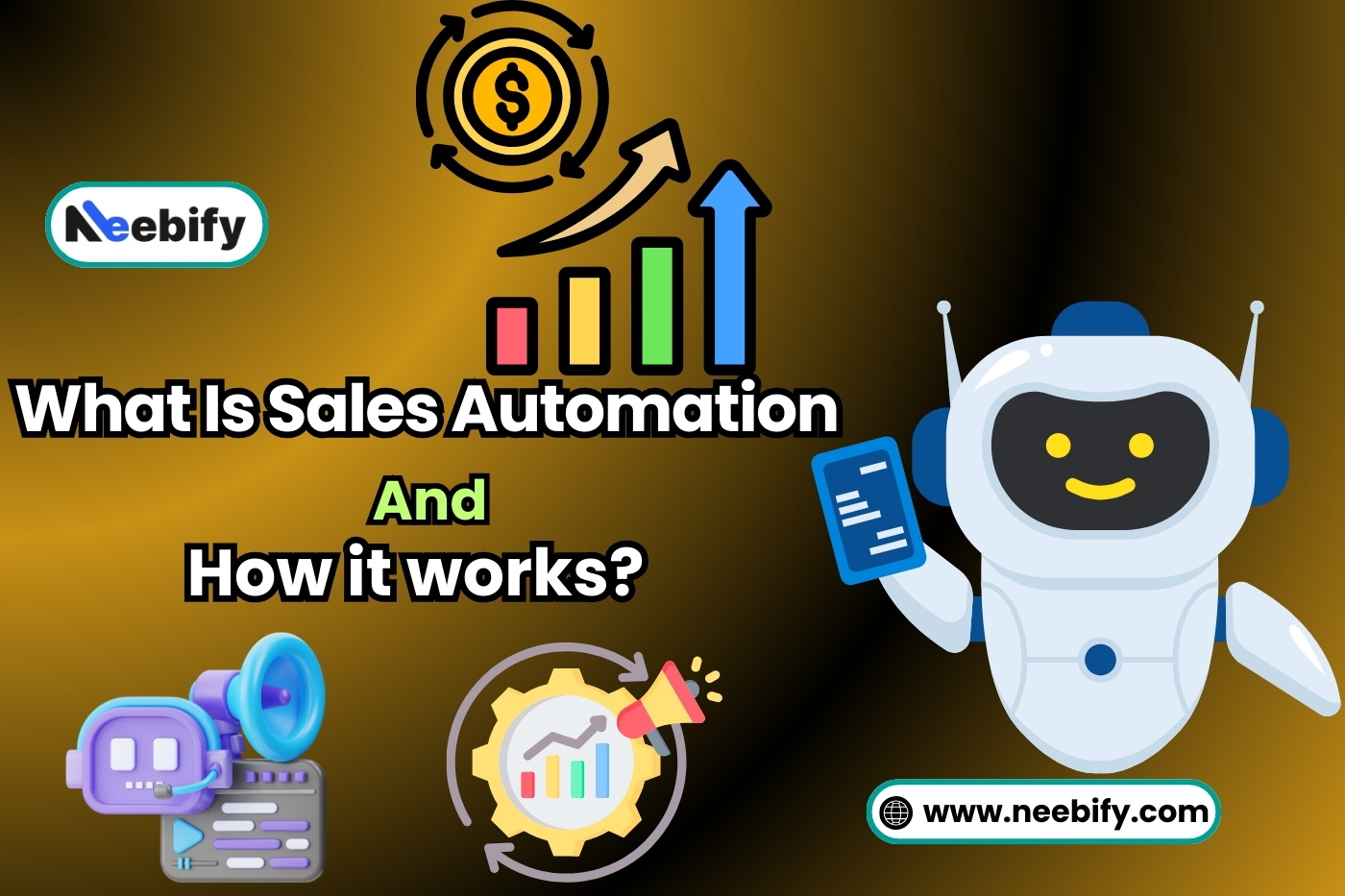Innovative AI Business Ideas In Various Industries

Artificial intelligence (AI) has transformed a number of businesses by offering creative fixes for challenging issues. This long list of ai business ideas includes many industries like healthcare, banking, education, and customer service. AI affects customer service and healthcare, improving engagement and patient care. AI simplifies processes in finance by detecting fraud, and it enables tailored learning platforms in education.
AI's skills assist every industry, from supply chain optimization to cybersecurity transformation. AI has the unmatched potential to spur creativity and efficiency across industries, influencing business practices globally as it develops.
List of AI Business Ideas
AI For Customer Service
Businesses use AI tools like chatbots and virtual assistants to enhance customer support, a practice known as AI-powered customer service. These AI systems may handle client inquiries, offer tailored support, and expedite communications, enhancing both operational effectiveness and overall customer happiness.
AI For Online Sales
AI can change online shopping by giving personalized product suggestions, adjusting prices, and offering virtual try-on features. Artificial intelligence (AI) algorithms examine consumer preferences and behaviour to provide personalized recommendations that increase sales and improve the shopping experience for customers.
AI For Medical Solutions
AI-based healthcare solutions offer personalized treatment recommendations, remote patient monitoring, and diagnostic tools. These solutions analyze medical data,improve diagnosis accuracy, and enhance patient care. By using innovative algorithms, AI solutions help improve health outcomes and reduce costs for healthcare organizations.
AI For Finance and Banking
AI is important in banking and finance for risk assessment, fraud detection, and personalized financial advice. Intelligent artificial intelligence (AI) algorithms examine transaction data to spot suspicious activity and stop fraud. At the same time, AI-powered robo-advisors offer automatic investment advice based on client preferences and market trends.
AI For Marketing
AI algorithms in AI-powered marketing analyze client data, predict consumer behavior, and improve advertising campaigns. Using AI tech, companies can target specific client groups, offer personalized content, and boost marketing campaign effectiveness. This leads to higher engagement and conversion rates.
AI For Education
Through tailored educational content, AI tutors, and adaptive learning platforms, artificial intelligence (AI) technologies can improve learning experiences in the field of education. To customize learning materials and deliver tailored education, AI algorithms evaluate student performance data. This promotes student engagement and enhances academic results.
AI For Supply Chain Management
Supply chain management systems powered by ai business ideas forecasting, inventory control, and transportation procedures. To forecast demand, optimize inventory levels, and streamline distribution networks, artificial intelligence (AI) algorithms examine past data and market patterns. This helps companies cut costs and increase efficiency in their supply chain operations.
AI For Agriculture
AI technologies provide cutting-edge solutions for agricultural precision farming, crop monitoring, and pest identification. Drones and sensors equipped with artificial intelligence (AI) gather information about crop health and environmental factors. AI algorithms then use this information to analyze irrigation schedules, identify crop illnesses, and enhance yield estimates, assisting farmers in making more informed decisions and producing more.
AI For HR and Recruiting
AI-powered tools in HR and hiring, like resume screening and candidate matching, speed up the hiring process. Employers can use data from AI systems to make informed HR decisions, including improving employee performance and retention. AI algorithms scan resumes and job descriptions to find qualified individuals.
AI For Real Estate
Artificial Intelligence (AI) is transforming the real estate sector by offering solutions for virtual property tours, market analyzing, and property assessment. AI-driven virtual tours give potential purchasers immersive experiences that accelerate sales and increase customer happiness. AI algorithms analyze real estate data to predict property values, market trends, and investment opportunities.
AI For Logistics and Transportation
AI-powered systems in transportation optimize route planning, fleet management, and maintenance. AI algorithms analyze traffic, weather, and vehicle data to plan maintenance tasks, improve delivery routes, and reduce downtime. This helps companies run their logistics operations more profitably and efficiently.
AI For Cybersecurity
AI-driven cybersecurity solutions provide advanced threat detection, incident response, and vulnerability management capabilities. Artificial intelligence (AI)--powered threat intelligence solutions offer useful insights to assist organizations in defending against cyberattacks and data breaches. At the same time, AI algorithms analyze network traffic, user behaviour, and security logs to identify suspicious activity and possible security risks.
AI For Gaming
With intelligent non-player characters (NPCs), generative content creation, and adjustable difficulty settings, artificial intelligence (AI) technologies improve gaming experiences. While AI-driven content creation tools offer dynamic game worlds and challenges to keep players interested and delighted, AI algorithms mimic human behaviour and learning to produce immersive gameplay experiences.
AI For Legal Services
In the legal sector, AI-powered legal services provide answers for compliance, contract evaluation, and legal research. Lawyers can save time and money by using AI. AI can help them review legal documents, spot risks, ensure compliance, and speed up legal processes.
Provide Legal Professionals With AI-Powered Solutions
AI For Production
In the industrial sector, AI-driven manufacturing solutions optimize production procedures, quality assurance, and preventive maintenance. Artificial intelligence (AI)-driven robotics and automation systems increase efficiency and flexibility on the factory floor. At the same time, AI-powered manufacturing data analysis algorithms spot inefficiencies, discover flaws, and forecast equipment breakdowns.
AI For Energy Management
AI technologies revolutionize energy management by enabling demand forecasting, energy optimization, and predictive maintenance in the energy sector. Artificial Intelligence (AI) algorithms examine energy consumption data, weather forecasts, and equipment performance indicators to maximize energy efficiency, minimize expenses, and avoid equipment downtime. This allows organizations to enhance the sustainability and efficiency of their energy operations.
AI For Entertainment
AI solutions for content creation, audience engagement, and recommendation revolutionize entertainment experiences. While AI-driven content-generating tools produce immersive experiences and interactive entertainment to keep audiences interested and entertained, AI algorithms assess user behaviour and preferences to tailor content recommendations.
AI For the Hospitality Industry
Revenue management, operational efficiency, and tailored services are some of the ways that ai business ideas improve client experiences in the hospitality sector. AI systems help hotels make more money and keep customers happy by adjusting prices and managing inventory. They also use data to personalize services and offers based on guest preferences.
AI For Environmental Tracking
Artificial Intelligence (AI) technologies present inventive approaches to pollution detection, wildlife conservation, and environmental monitoring. Artificial intelligence (AI)-enabled sensors and drones gather data on the quality of the air and water. AI algorithms then use this data to identify pollution sources, track changes in the environment, and safeguard wildlife habitats. This process allows environmental agencies and conservation organizations to make well-informed decisions and act quickly to protect the environment.
AI For Sports Analytic
AI-powered sports analytic systems use data to analyze player performance, game strategies, and fan engagement in sports. AI algorithms examine player stats and game videos to identify patterns and trends. AI platforms improve fan experiences with personalized content and interactive features to enhance enjoyment of the game.
AI For Personalized Nutrition
AI-powered meal planning, nutritional recommendations, and dietary analysis tools are revolutionizing personalized nutrition. Artificial intelligence (AI)-powered food ingredient analysis tools assist people in making educated decisions about their diet and nutrition, enabling them to achieve their health and wellness goals. AI algorithms analyze individual health data, dietary preferences, and nutritional requirements to generate personalized meal plans and dietary recommendations.
AI For Retail and Fashion
Virtual fitting rooms, dynamic pricing tactics, and personalized recommendations are just a few of the ways AI-powered fashion and retail solutions are revolutionizing the shopping experience. Artificial intelligence (AI) systems examine customer preferences and behaviour to provide personalized product recommendations. Additionally, AI-powered virtual fitting rooms let customers virtually try on clothing, improving the online shopping experience and cutting down on returns.
AI For Smart Cities
In smart cities, AI technologies are revolutionizing public services, infrastructure management, and urban planning. AI technology helps city planners make better decisions to improve life for people. It uses data from sensors, cameras, and other devices to manage traffic, save energy, and enhance safety.
AI For Language Translation
Artificial intelligence-driven language translation solutions enable instantaneous translation services for both individuals and enterprises, dismantling linguistic obstacles and promoting communication in contexts with many languages. While AI-driven localization technologies adjust content for diverse languages and cultures, allowing ai business ideas to reach global audiences efficiently. AI algorithms evaluate language patterns and context to generate accurate and natural-sounding translations.
AI For Personal Finance Management
AI-powered personal money management programs assist people in setting and sticking to budgets and achieving their financial objectives. While AI-driven budgeting tools assist people in keeping track of their spending and making wise investment and savings decisions, they also help people improve their overall financial health and well-being by analyzing financial data such as income, expenses, and investments.
READ ALSO- How Is Artificial Intelligence In Stock Trading Altering Market?
Essential Skills For Pursuing AI Business Ideas
Technical Proficiency
Understanding machine learning methods and programming languages like Python is fundamental to creating AI solutions. Moreover, proficiency with AI frameworks like TensorFlow enables effective model implementation and optimization, guaranteeing the efficacy of AI in handling intricate issues and yielding measurable outcomes for enterprises.
Industry Knowledge
It is important to understand the details of the industry where the AI solution will be used. Knowing market trends, laws, and challenges faced by companies in that field is crucial. Understanding the industry where the AI solution will be used is crucial.
This includes knowing market trends, laws, and challenges faced by companies in that field. With this knowledge, AI experts can create customized solutions to address specific issues and capitalize on new opportunities. This can lead to meaningful outcomes.
Business Acumen
Successful AI endeavour require not only technical proficiency but also strong project management, marketing, and sales abilities. AI projects are executed smoothly and within budget when project management is done well. Meanwhile, to properly position AI solutions in the market, draw in potential customers, and promote acceptance and growth, astute marketing techniques and robust sales skills are essential.
Conclusion
Artificial intelligence (AI) offers a plethora of business opportunities across several industries, radically changing corporate processes, improving consumer relations, and stimulating creativity. AI-driven solutions are altering sectors and advancing them towards a future characterized by efficiency and innovation. These solutions range from empowering e-commerce platforms and improving customer service to revolutionizing healthcare and finance.
Businesses that embrace AI's trans-formative potential put themselves at the vanguard of innovation, ready to take advantage of new possibilities and fulfil changing customer needs. The widespread impact of AI across industries highlights its critical role in reshaping the corporate environment. It indicates that it will continue to grow and advance in the years to come.
FAQs Regarding AI Business Ideas
Q.1- How are ai business ideas different from conventional business concepts?
A- Artificial intelligence technologies are used in AI business concepts to create creative solutions that tackle particular problems in a range of industries. In contrast to traditional business concepts, AI for startup ideas leverage machine learning, natural language processing, and other AI techniques to create personalized experiences, automate processes, and analyze data—all of which boost productivity, efficiency, and competitiveness.
Q.2- In the current market, how can entrepreneurs find feasible AI company ideas?
A- Entrepreneurs should do thorough market research to understand industry trends, challenges, and new opportunities. Entrepreneurs need to research the market to understand industry trends, challenges, and new opportunities. This will help them discover AI business ideas that align with their skills, resources, and potential.
Q.3- Which industries have seen successful use of AI business ideas?
A- Numerous areas, including healthcare, banking, e-commerce, education, and more, have seen the success of AI for startup ideas. AI-powered healthcare diagnostics, financial fraud detection, e-commerce tailored recommendations, education's adaptive learning platforms, and customer service virtual assistants are a few examples. These AI technologies provide concrete advantages, including increased accuracy, efficiency, and customer happiness, while addressing particular problems in each business.
Q.4- What knowledge and assets are required for business owners to explore AI venture ideas?
A- It takes a combination of technical know-how, domain expertise, and resource accessibility to pursue AI business concepts. Proficiency in programming languages such as Python, comprehension of machine learning techniques, and acquaintance with AI frameworks and tools are examples of technical skills. To successfully bring the AI solution to market, project management, marketing, and sales expertise are also essential, as is domain knowledge unique to the industry where the AI solution will be used.
Q.5- How can AI entrepreneurs get beyond difficulties and roadblocks to put their business plans into action?
A- AI firms that cultivate a culture of invention, teamwork, and ongoing learning within their teams can surmount implementation hurdles. Additionally, they should give top priority to user feedback, refine their AI solutions in light of practical applications, and maintain flexibility in the face of shifting market conditions. AI companies can also successfully traverse obstacles and execute their business concepts by forming solid alliances, making the most of networking and mentor-ship opportunities, and consulting with seasoned experts.









